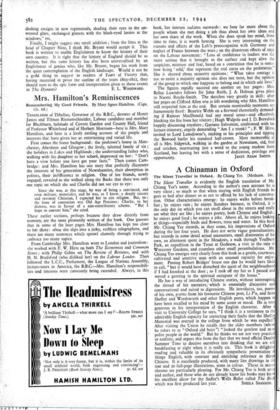A Chinaman in Oxford
The Silent Traveller in Oxford. .By Chiang Yee. (Methuen. 16s.;
The Silent Traveller is evidently the English translation of Mr. Chiang Yee's name. According to the author's own account he is very silent ; so much so that when staying with English friends he goes to bed after dinner so as not to offend by his lack of conversa- tion. Other characteristics emerge: he enjoys walks before _break- fast ; he enjoys rain ; he enjoys Sundays because, in Oxford, it is the only day on which you can stroll about in the streets and really see what they are like ; he enjoys poetry, both Chinese and English ; he enjoys good food ; he enjoys a joke. Above all, he enjoys looking at things—especially birds and flowers, trees and water. In this book Mr. Chiang Yee records, as they come, his impressions of Oxford during the last four years. He does not write vague generalisations, but records in some detail actual encounters, small discoveries of his own, an afternoon spent in the Meadows, a walk through Youlbury Park, an expedition to the Trout at Godstow, a visit in the rain to Worcester Gardens, and countless other small perambulations. Mr. Chiang Yee emerges very clearly from this book as a gentle, courteous, cultivated and sensitive man with an unusual capacity for .enjoy- ment. Passing Robert Bridges' house one day he would have liked to call, "but it would have disturbed the quiet of the neighbourhood if I had knocked at the door ; so I took off my hat -as I passed and waved a greeting to the spiritual occupant of the house."
He has a way of introducing Chinese stories, without interrupting the thread of his narrative,- which is essentially discursive and conversational and suited to digressions. He introduces, too, poems of his own, poems from his favourite Chinese poet, Li P'o, and from Shelley and Wordsworth and other English poets, which happen to have been recalled to his mind by some scene or mood. He is very generous in his interpretation of the English character. After a visit to University College he says, " I think it is a testimony to the admirable English capacity for correcting their faults that the Shellzv Memorial was erected in the college from which he was expelled.' After visiting the Union he recalls that the older members (whc he refers to as " Oxford old boys ") " looked the gentlest and nos 'polite people in the world." But he thinks we are not-very practic or realistic, and argues this from the fact that we need official Doubl Summer Time to deceive ourselves into thinking that we are ski breakfasting at eight when it is really six. This book is delightf reading and valuable in its obviously sympathetic presentation o things English, with constant and enriching reference to thing Chinese. It is excellently produced, with many line drawings in th text and 2o full-page illustrations, some in colour. Those in mor chrome are particularly pleasing. For Mr. Chiang Yee is both anis and author, and those who do not already know his books may kn.) his excellent dicor for the Sadler's Wells Ballet called The Bit which was first produced last year. - SHEILA SHANNON.


























 Previous page
Previous page